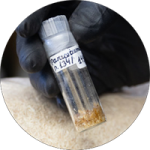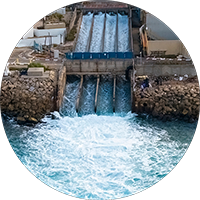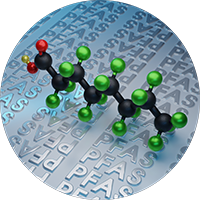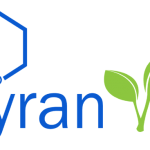Explore examples of our clean technologies
Supercharging Photosynthesis to Increase Carbon Storage, Aromatics Production
 A team of botanists engineered a strain of Arabidopsis with mutations to a gene called DHS. The mutant plants showed a 30 percent increase in carbon dioxide capture as well as hyper accumulation of aromatic amino acids.
A team of botanists engineered a strain of Arabidopsis with mutations to a gene called DHS. The mutant plants showed a 30 percent increase in carbon dioxide capture as well as hyper accumulation of aromatic amino acids.
Watch the video >
Read the technology summary >
Hiroshi Maeda, Ryo Yokoyama, Marcos Vinicius Viana de Oliveira
Recycling of Plastics by Solvent-Targeted Recovery and Precipitation (STRAP)
 Chemical and biological engineers have developed a process to recycle mixed/multilayer plastics, which can’t be recycled using conventional methods. The solvent-based plastic recycling process could cut down on millions of tons of plastic waste.
Chemical and biological engineers have developed a process to recycle mixed/multilayer plastics, which can’t be recycled using conventional methods. The solvent-based plastic recycling process could cut down on millions of tons of plastic waste.
Watch the video >
Read a news story >
Read the technology summary >
George Huber, Kevin Sanchez-Rivera, Reid Van Lehn, Theodore Walker, Panzheng Zhou
‘Green’ Tylenol: Synthesizing Acetaminophen from Renewable Biomass
 Researchers from the Great Lakes Bioenergy Research Center have developed a cost-effective and environmentally sustainable way to make a popular pain reliever and other valuable products from plants instead of petroleum.
Researchers from the Great Lakes Bioenergy Research Center have developed a cost-effective and environmentally sustainable way to make a popular pain reliever and other valuable products from plants instead of petroleum.
Read a news story >
Read the technology summary >
John Ralph, Steven Karlen, Justin Mobley
Desalination ‘Battery’ Could Slake a Thirsty World
 A team of chemists has designed a rechargeable desalination cell that can operate on seawater and is capable of performing a desalination/salination cycle with a net potential input as low as 0.2 volts.
A team of chemists has designed a rechargeable desalination cell that can operate on seawater and is capable of performing a desalination/salination cycle with a net potential input as low as 0.2 volts.
Read a news story >
Read the technology summary >
Kyoung-Shin Choi, Dohwan Nam
Bearingless Electrical Machine
 An electrical and computer engineer is developing bearingless magnetic motors that could lead to new types of more efficient, more adaptable motors.
An electrical and computer engineer is developing bearingless magnetic motors that could lead to new types of more efficient, more adaptable motors.
Read a news story >
Read the technology summary >
Eric Severson
Tandem Electrochemical Advanced Oxidative Processes to Effectively Degrade Perfluorooctanesulfonic Acid (PFOS)
 A team of chemists is working to improve the efficacy and efficiency of PFAS degradation by cycling between an activation and degradation step, which results in a more complete degradation. A key aspect of this work is the unique mediated decoupled process to avoid side reactions.
A team of chemists is working to improve the efficacy and efficiency of PFAS degradation by cycling between an activation and degradation step, which results in a more complete degradation. A key aspect of this work is the unique mediated decoupled process to avoid side reactions.
2024 Young Chemist Award >
Read the technology summary >
Song Jin, Katelyn Michael
Discover innovative clean tech startups
Flux XII utilizes state-of-the-art liquid electrode redox materials for aqueous redox flow batteries (RFBs) through molecular engineering. RFBs will provide high energy density, long-lifetime electricity storage at a fraction of the cost of existing grid energy storage technologies.
Learn more >
Dawei Feng, Patrick Sullivan, Xiuliang Lyu
Alithic, formerly Earth Repair, developed Distributed Direct Air Capture with Rapid Mineral Carbonation (DDAC-REACT) technology that will enable lower cost, higher efficiency carbon removal by utilizing high CO2 industrial waste as feedstock and storing the captured CO2 in stable, mineralized form for disposal and as raw material for production of CO2-rich materials.
Learn more >
Bu Wang, Rob Anex
Pyran has harnessed the power of nature to produce 1,5-PDO, a green 5-carbon alternate to petroleum-based 4- and 6-carbon diols used in everyday products like paints and coatings.
Learn more >
George Huber, Kevin Barnett
Realta Fusion’s compact and scalable fusion energy system provides efficient and reliable solutions for decarbonizing industrial heat and power.
Learn more >
Cary Forest, Kieran Furlong
C-Motive Technologies is the first and only company commercializing sustainable, high-efficiency motor technology using electrostatic principles to decarbonize stationary industrial and e-mobility applications.
Learn more >
Dan Ludois, Justin Reed
See examples of sustainability initiatives
The Sustainability Research Hub exists to make UW-Madison a preeminent destination for environmental sustainability research and education by supporting innovative, large-scale, cross-cutting sustainability research on campus and beyond.
The Center for Climatic Research focuses on interdisciplinary research regarding the Earth’s climate system, including the causes and impacts of historical, ongoing and projected climate variability and change, with geographic focuses that span from local to global scale. The center’s diverse activities and societal contributions include the training of students and postdoctoral researchers as the next generation of climate scientists, development of guidance for state government and regional stakeholders regarding climate change impacts and adaptation, and advancement of scientific understanding of the coupled Earth system.
Federal support is helping UW-Madison broaden its ability to study potentially harmful “forever chemicals” that are infiltrating our soil and water. Nearly $1 million in federal funding will support establishing a PFAS Center of Excellence and a major equipment upgrade in the Water Science and Engineering Laboratory that will bolster cross-campus efforts to study per- and polyfluoroalkyl (PFAS) chemicals.
In 2023, a Wisconsin partnership led by WiSys, a supporting foundation of the Universities of Wisconsin, was awarded $999,911 from the National Science Foundation’s Regional Innovation Engines program. The award supports a partnership of 30 organizations across the state as they lay the groundwork to develop an ambitious, effective and credible ‘regional innovation engine’ that harnesses the region’s talent and intellectual capital to make Wisconsin a global leader in sustainable agriculture.
Environmental Sustainability Initiative
UW-Madison has a rich history of advancing environmental sustainability through its excellence in fields ranging from ecology to wildlife biology to satellite technology. Building on this tradition, the university is launching a new cross-campus initiative focused on environmental sustainability. The plan represents the most comprehensive environmental sustainability initiative in UW-Madison’s history and will advance the university’s research and education missions while also making campus a living laboratory for sustainable practices.
Sustainability and the Global Environment
The Center for Sustainability and the Global Environment brings together researchers from the natural, health and social sciences, engineering and other fields to study problems stemming from interactions between environmental systems, natural resources and human activity, and to inform technology and policy solutions.




